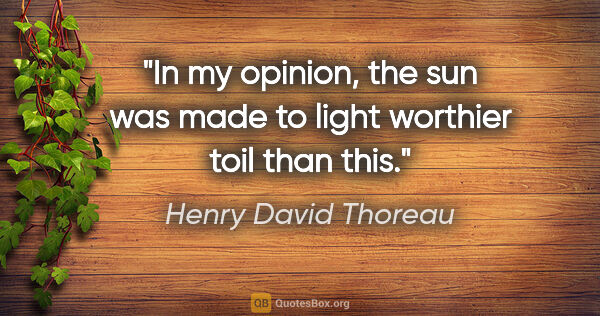Toiling Quotes (page 4)
Fare well we call to hearth and hall. Though wind may blow and rain may fall. We must away ere break of day. Over the wood and mountain tall. To Rivendell where Elves yet dwell. In glades beneath the misty fell. Through moor and waste we ride in haste. And wither then we cannot tell. With foes ahead behind us dread. Beneath the sky shall be our bed. Until at last our toil be sped. Our journey done, our errand sped. We must away! We must away! We ride before the break of day!
J. R. R. Tolkien
Sweet moonlight, shining full and clear,
Why do you light my torture here?
How often have you seen me toil,
Burning last drops of midnight oil.
On books and papers as I read,
My friend, your mournful light you shed.
If only I could flee this den
And walk the mountain-tops again,
Through moonlit meadows make my way,
In mountain caves with spirits play -
Released from learning's musty cell,
Your healing dew would make me well!
Johann Wolfgang von Goethe
The birds sang, the proles sang. the Party did not sing. All round the world, in London and New York, in Africa and Brazil, and in the mysterious, forbidden lands beyond the frontiers, in the streets of Paris and Berlin, in the villages of the endless Russian plain, in the bazaars of China and Japan? everywhere stood the same solid unconquerable figure, made monstrous by work and childbearing, toiling from birth to death and still singing.
George Orwell
And thus ever by day and night, under the sun and under the stars, climbing the dusty hills and toiling along the weary plains, journeying by land and journeying by sea, coming and going so strangely, to meet and to act and react on one another, move all we restless travellers through the pilgrimage of life.
Charles Dickens

When a job is undertaken form necessity...the worker is self-consciously aware of the toils and pains he undergoes...But when the job is a labor of love, the sacrifices will present themselves to the worker--strange as it may seem--in the guise of enjoyment. Moralists, looking on at this, will always judge that the former kind of sacrifice is more admirable than the later, because the moralist, whatever he may pretend, has far more respect for pride than for love...I do not mean that there is...
Dorothy L. Sayers

But what could be the purpose of the unseasonable toil, which was again resumed, as the watchman knew by the lines of lamp-light through the crevices of Owen Warland's shutters? The townspeople had one comprehensive explanation of all these singularities. Owen Warland had gone mad! How universally efficacious--how satisfactory, too, and soothing to the injured sensibility of narrowness and dullness--is this easy method of accounting for whatever lies beyond the world's most ordinary scope!-...
Nathaniel Hawthorne
